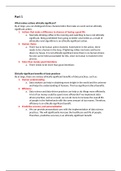Part 1
What makes actions ethically significant?
By at large, you can distinguish three characteristics that make an event and an ethically
significant action:
1. Actions that make a difference to chances of having a good life
a. Normally drinking coffee in the morning and switching to tea is not ethically
significant. Being prohibited from going to better universities as a result of
ethnically racist algorithms is an ethically significant action.
2. Human choice
a. There has to be human action involved. Somewhere in the action, there
needs to be a human in the loop. If lightning strikes my home and burns
down my house, it is not ethically significant since there is no human choice.
No one can be held accountable for this, since no human is involved in the
process.
3. More than merely good intentions
a. There needs to be more than good intentions
Ethically significant benefits of data practices
By at large, there are various ethically significant benefits of data practices, such as:
1. Human understanding
a. Data analysis can help in obtaining more insight in the world and the universe
and helps the understanding of humans. This has significant ethical benefits.
2. Efficiency
a. Data science and data-driven practices can help us do things more efficiently.
A lot of tax money could be spent more efficiently if we implement data-
driven practices, and as a result, we can do more to increase the overall life
of people in the Netherlands with the same amount of tax money. Therefore,
efficiency is an ethically significant benefit.
3. Predictive accuracy and personalization
a. We can provide personalized care with the implementation of data science
practices. This will significantly increase the healthcare and life of people.
Therefore, predictive accuracy is an ethically significant benefit.
,Ethically significant harms of data practices
The most significant harms you can expect in data-driven practices are:
1. Harms to privacy and security
a. If we are collecting and analyzing enormous amount of personal data, it
becomes increasingly likely that we are able to identify people and get to
know people in a very personal and intimate way without them knowing that.
b. These data-driven practices can also threaten the personal security. It
becomes increasingly attractive to criminals to hack databases as datasets
become large and rich. On a personal level, databases containing names and
identity attributes of crimes can be leaked and touches upon the personal
security of people.
2. Harms to fairness and justice
a. The algorithm deciding on the outcome of education is an example of harm
to fairness and justice. We want to treat people in a similar, or equal, way
that is fair. Data-driven practices could be biased and are contradictory to
fairness and equality.
3. Harms to transparency and autonomy
a. Data-driven practices are opaque, difficult and complex to understand.
Therefore, systems must be transparent in order for people to understand
what that system does and what it does with their personal data. If I do not
know why I do not receive an A-level grade from the education algorithm, I
could never improve and that could harm my prospects for the future.
Law vs Ethics
First comply with the law, and within that action space, you can develop ethics on a
personal, company, design, and technology to further implement your values. Ethics is by
and large not legally binding while law is. If you don’t comply with law, you can be punished.
, The three levels of ethics:
1. At the core, you have the values that you want to embed in the
devices/applications/services that are designed or developed.
2. It is not just about technology. Ethics is also about the people that develop the
technology. What kind of virtues, or moral skills, do you need to make sure that
your applications contribute to the lives of people? To make ethically significant
benefits rather than harms.
3. Finally, is the organizational level. You can have properly embedded values in the
technology with people that have the right virtues, but if the organization that does
not have checks and balance, or ethical oversight, then it becomes ethics washing.
Moral theories:
- Utilitarianism, which focuses on the outcome of an action
- Kantian ethics, which focuses more on the reasons for an action
- Virtue ethics, which is more about your character (how to develop a moral
character).





